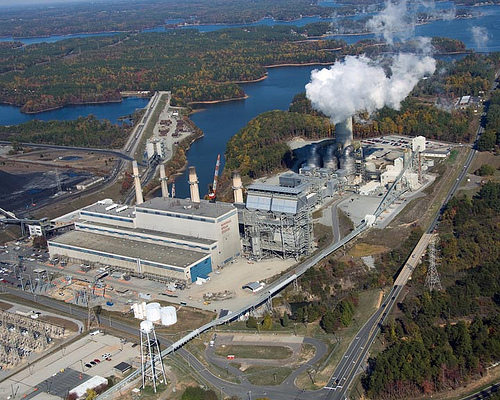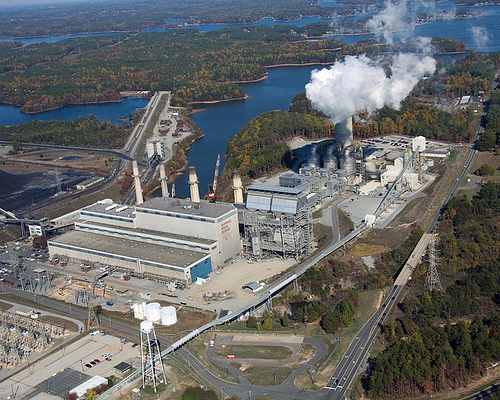 This steam station in North Carolina finished installing scrubbers in 2007.Photo: Duke EnergyCross-posted from the Natural Resources Defense Council.
This steam station in North Carolina finished installing scrubbers in 2007.Photo: Duke EnergyCross-posted from the Natural Resources Defense Council.
Selling death on Capitol Hill shouldn’t be so easy.
But as industry lobbyists mount a campaign attacking forthcoming Clean Air Act standards to cut deadly toxic air pollution from industrial boilers, they are resorting to obfuscation and deceiving Congress.
The EPA standards, relying on long-available pollution-control equipment called scrubbers, would save up to 5,000 lives a year. And they would prevent 3,000 heart attacks, 1,400 cases of chronic bronchitis, 35,000 bouts of aggravated asthma, and 1,600,000 outbreaks of acute respiratory distress, according to the agency — all a direct result of eliminating hundreds of thousands of tons of toxic pollutants like mercury, lead, dioxins, acid gases, sulfur dioxide, and soot.
These harmful air pollutants are emitted by equipment called boilers, which burn various types of fuel to produce steam that then is used to produce electricity or heat for industrial processes. Polluting industries, however, don’t want to install scrubbers for these boilers.
So their lobbyists are pushing an exemption from the Clean Air Act’s protective control technology standards for certain toxic air pollutants including hydrogen chloride. The lobbyists prefer vastly weaker standards that will not require scrubbers or equally effective measures, and therefore would not save the thousands of lives each year that the EPA says its standards will save.
Industry’s desired exemption — from responsibility for deadly pollution
Naturally, the lobbyists don’t like to acknowledge that what they are demanding is an exemption from the law’s stronger, required controls. So instead they use the Orwellian label, “health-based compliance alternative.”
The Clean Air Act allows such an exemption for a toxic air pollutant, but only in the rare situations when the EPA already has identified a health threshold for that pollutant below which no harm can be said to occur. The EPA has not made this showing for hydrogen chloride or the other toxic pollutants pushed by industry lobbyists. The EPA has said correctly that the facts do not justify such a showing.
Instead, the EPA has proposed to establish an emission limit for hydrogen chloride. This is because this air toxin is harmful and emitted by boilers in the hundreds of thousands of tons. It is also because cleaning up hydrogen chloride also will result in cleaning up other acid gases such as chlorine gas, hydrogen fluoride, and hydrogen cyanide.
Hydrogen chloride causes well-known respiratory effects, including “corrosive tissue damage,” burning of the respiratory tract, and fluid in the lungs. Chlorine gas causes burning of the eyes, skin, and respiratory system. Hydrogen cyanide is a known neurotoxin, impacting the lungs, heart, and central nervous system. Exposure to hydrogen fluoride gas can result in lung collapse or hemorrhaging, and long-term exposure has been linked to kidney and liver damage.
As EPA Administrator Lisa Jackson recently explained in a letter to senators, “the pollution control equipment that limits emissions of hydrogen chloride also happens to limit emissions of other highly toxic air emissions, including acid gases.”
EPA says that “wet scrubbers … will likely be necessary to achieve the proposed [hydrogen chloride] emission limit,” thereby reducing dangerous hydrogen chloride pollution but also chlorine gas, hydrogen fluoride, and hydrogen cyanide.
Now here are the two crucial points that industry lobbyists somehow always fail to mention when they claim that adopting their desired exemption will cause no harm.
First crucial point: Scrubbers also reduce fine particulate matter (PM2.5) and PM2.5 precursors, chiefly sulfur dioxide (SO2). It is these fine particles that lodge deep in the lungs and are most responsible for causing the premature death attributable to industrial boilers’ air pollution. According to EPA, these scrubbers can achieve an 85 percent reduction in particulate matter emissions and greater than a 95 percent reduction in SO2 emissions.
Second crucial point: EPA confirms that installing scrubbers is what will avoid up to 5,000 deaths every year by reducing the deadly particulate matter and SO2 pollution, along with the reductions in acid gases.
So what’s the bottom line? When industry lobbyists demand an exemption for hydrogen chloride and other air toxins, they are seeking to avoid using scrubbers that will save up to 5,000 lives each year. These lobbyists are demanding weaker standards that will allow industrial boilers’ toxic air pollution to continue killing as many as 5,000 Americans every year.
Deceiving Congress
None of the lobbying materials distributed on Capitol Hill by industry critics of the EPA standards mention these deadly facts or connections. None of the lobbying materials disclose how many fewer lives will be saved by adopting the desired exemption, nor do the materials even acknowledge that the exemption will have harmful consequences.
Instead, the lobbyists resort to various forms of gross deception. The Council of Industrial Boiler Owners describes the exemption as a “health-based approach” and claims that it “would result in roughly equivalent environmental benefit.” Only if “roughly equivalent” means allowing thousands more people to die unnecessarily every year.
The American Forest & Paper Association calls the exemption a “health threshold standard” and argues that it is seeking a standard that is “no more stringent and no less stringent than needed to get the job done.” Again, only if “getting the job done” means weakening EPA’s standards to allow thousands of needless deaths every year.
More typically, these groups’ lobbying materials simply ignore the health consequences of their demands altogether. Instead, they change the subject to other issues. I have read much of these industry materials and it is impossible for a Congressional office to begin to understand from these materials how much more air pollution would result from what industry is seeking, and how many more deaths and heart attacks and bronchitis and asthma cases would result. Those things are not the lobbyists’ concerns.
These pervasive deceptions and omissions help explain the contradiction whereby members of the House and Senate have written letters to EPA Administrator Lisa Jackson urging her to consider adoption of industry’s desired “health threshold approach,” at the same time that they emphasize that they want air pollution reduced to levels that are safe for public health.
It is entirely understandable that these Congressional offices fail to realize that adoption of the lobbyists’ exemption is incompatible with protecting public health. After all, the lobbyists have done everything in their power to deceive Congress.
There is no indication in these letters that Congress wants to block the EPA from saving up to 5,000 lives every year. To the contrary, the Senate sign-on letter stresses that any consideration of the exemption should “not compromise public health and safety.” The House sign-on letter similarly states that any regulatory approach should “protect the environment and public health.”
Industry commenters have raised various concerns with the proposed industrial boiler standards, some of which might be valid. The notice-and-comment rulemaking process is designed to allow the EPA to ad
dress those concerns carefully and thoughtfully, by responding to all comments on a formal record that is subject to judicial review.
But the industry lobbyists do not raise valid concerns when they contend that there are no health concerns with exempting acid gases. They are not making valid demands when they argue that companies should be allowed to avoid having to control these gases, particulate matter, and SO2 emissions using the protective control measures required by the Clean Air Act.
Industry lobbyists realize that their arguments lack merit, on the merits. The Council of Industrial Boiler Owners devotes only a few throw-away paragraphs (in its 127 pages of comments) to a half-hearted attempt to argue that acid gases pose no health concerns. Their comments do not even contest the EPA’s contrary findings nor do they present any new information to suggest a different conclusion. And of course they ignore the connections the scrubbers have to stopping particulate matter and SO2.
Polluter lobbyists sometimes get paid the big bucks to obfuscate and dispute uncomfortable truths, so they undoubtedly will protest aspects of this account.
When that happens, Congressional staff, journalists, and the public should ask them the following questions: should the EPA’s air toxic standards be protective enough to require scrubbers generally? Should the lobbyists’ clients have to install scrubbers to reduce the deadly toxic pollution emitted by industrial boilers? How many fewer American lives should the standards be allowed to save, compared to the 5,000 lives that EPA projects could be saved under its proposed standards?
How many Americans should be killed each year by industrial boilers’ toxic air pollution?
These industry lobbyists will continue to make deadly demands — but they should not get away with the same deceptions.
The lobbyists still will be selling death but no one should be buying it.




